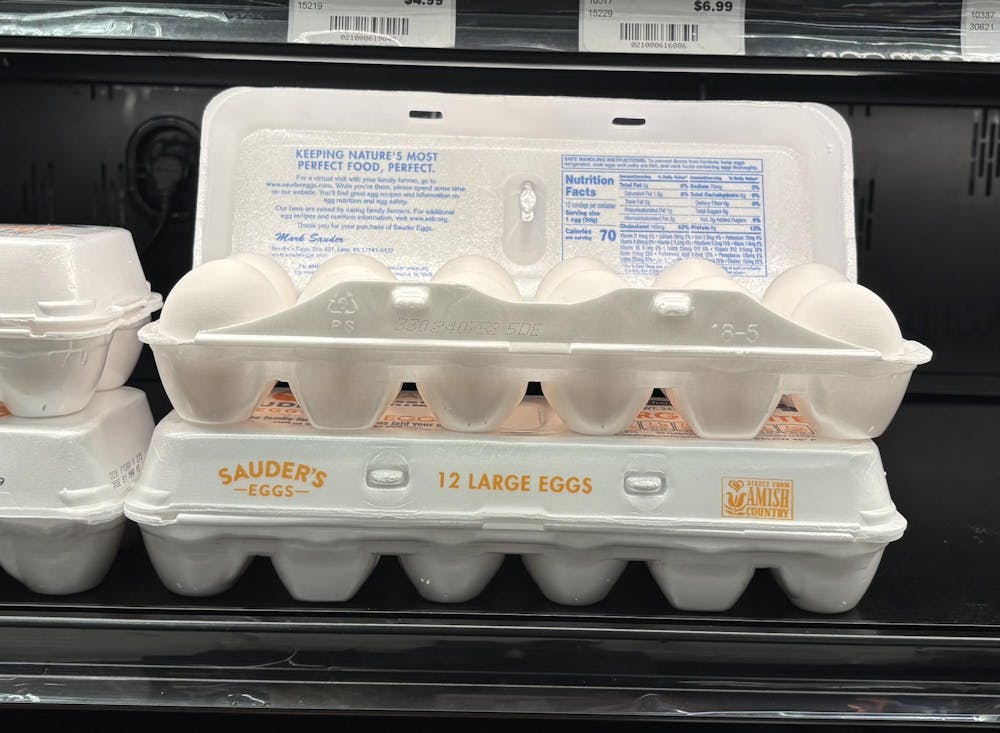As flu cases in New Jersey rise, another contagion, the avian flu, has caused an absence from students’ breakfast plates: shelled eggs.
Amid a national shortage, Princeton dining halls will not be serving shelled eggs in food preparations until further notice. At least one eating club, Cannon Dial Elm, has temporarily discontinued certain dining options with eggs.
As egg prices rise in New Jersey — consumers and grocery stores in the state report a dozen eggs selling for between $4 and $7 — cage-free eggs have borne the brunt of inflating prices. “Cage-free” refers to farm environments where chickens who lay eggs solely live in outdoor spaces, rather than wire cages.
According to Lauren Belinsky, the Assistant Director of Marketing and Communication for Campus Dining, cage-free liquid eggs are now being served in dining halls.
Signs posted in dining halls on campus on Feb. 15 notified students of this change, indicating that dining “will pause the use of all shell eggs in our operations until the national egg shortage stabilizes.”
Belinsky stated that the use of liquid eggs aims to ensure “minimal disruption” to the dining program and noted that dining has not yet received any feedback from students regarding the change.
Some students seeking their go-to egg orders in the dining halls reported initial surprise at the liquid egg alternative, but they found it to pose minimal problems to their breakfast experience.
Alexander Pereyra ’28 said in an interview with The Daily Princetonian, “I was really disappointed … I feel like that’s the one healthy thing you can really get here for breakfast. But it’s okay because they have the omelet mix and egg whites.”
“As we work with our suppliers, it has become clear that shelled eggs — particularly cage-free shelled eggs — are in very limited supply,” wrote Belinsky in an email to the ‘Prince.’
Alongside dining halls, Cannon Dial Elm Club has temporarily removed all eggs from its lunch menu due to rising prices, according to an email sent to the club from its general manager, William Conrad.
“Our egg price has increased $100 in the last 3 weeks for a case of 30 dozen and today [Feb. 11] I was not able to get eggs at all,” Conrad said in the email. The yellow eye BLT and egg quesadilla were removed from the Cannon Dial Elm lunch menu, effective Wednesday, Feb. 12.
While the change to liquid eggs in the dining halls may be temporary, its impact may be wide due to eggs’ popularity as a breakfast option.

“I’m appalled. I don’t understand. They were a staple in my breakfast,” said Emily Phillips ’28. “I love having my hard boiled eggs in the morning,” she added.
The move to liquid eggs marks the latest update in recently shifting dining hall practices pertaining to eggs. Last week, several dining halls temporarily shifted to using shelled caged eggs in light of supply issues — marking a break with a University commitment made in 2006 to serve cage-free eggs, a policy outlined in Campus Dining’s sustainability timeline.
The move toward cage-free eggs in 2006 was, in part, spurred by activism on the part of the student group Greening Princeton. The temporary reversal of this policy was not met with push back from student groups. However, not all community members approved of the decision.
Peter Singer, author of “Animal Liberation” and an emeritus professor of bioethics, wrote in a statement to the ‘Prince,’ “I am shocked that any dining hall at Princeton University would consider serving eggs from hens who are forced to live miserable lives, permanently crowded into small wire cages. My goodness, even McDonald’s is now using 100% cage-free eggs. Can’t the university with the world’s biggest endowment, per student, do at least as well as McDonald’s?”
McDonalds met its goal of sourcing 100 percent cage-free eggs in the United States in Feb. 2024.
“Eggs from caged hens have no place in any Princeton dining hall,” Singer continued.
Tess Weinreich is a senior News writer for the ‘Prince’ from Washington, D.C. She typically covers University operations. She was formerly a Managing Editor for the ‘Prince’.
Please direct any corrections to corrections[at]dailyprincetonian.com








